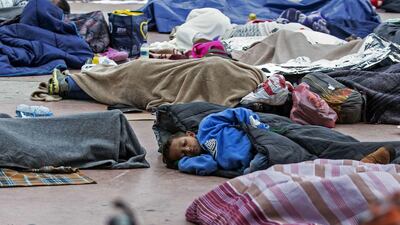After traveling through Mexico with great fanfare for a month under the Trump administration's watchful eye, nearly 200 Central American migrants attempting to seek asylum in the United States were stopped in their tracks when border inspectors said that a crossing facility didn't have enough space to accommodate them.
President Donald Trump vowed last week to "stop" the caravan while Cabinet members said they would deliver a swift response. The asylum seekers held firm, setting up a possible showdown.
In an anticlimactic twist, about 50 asylum seekers were allowed past a gate controlled by Mexican officials to walk across a long bridge but were stopped at the entrance to the U.S. inspection facility at the other end. They were allowed to wait outside the building, technically on Mexican soil, without word of when U.S. officials would let them claim asylum.
Another 50 or so camped on blankets and backpacks in Tijuana outside the Mexican side of the crossing, prohibited from even getting close to the U.S. inspection building.
The asylum-seekers began the day with anticipation, traveling in red-and-white school buses under police escort to a beachfront rally in Tijuana. They sang the Honduran national anthem, and supporters on the San Diego side of the fence waved a Honduran flag.
After a final briefing from lawyers and minutes before they were to begin a short walk to the border crossing, U.S. Customs and Border Protection Commissioner Kevin McAleenan announced that the San Ysidro border crossing, the nation's busiest, had "reached capacity" for people without legal documents and that asylum-seekers may need to wait in Mexico temporarily.
Attorney General Jeff Sessions has called the caravan "a deliberate attempt to undermine our laws and overwhelm our system."
The administration's stern warnings left organizers in disbelief that border inspectors were not ready for them.
"They have been well aware that a caravan is going to arrive at the border," Nicole Ramos, an attorney working on behalf of caravan members, said at a news conference.
"The failure to prepare and failure to get sufficient agents and resources is not the fault of the most vulnerable among us. We can build a base in Iraq in under a week. We can't process 200 refugees. I don't believe it."

